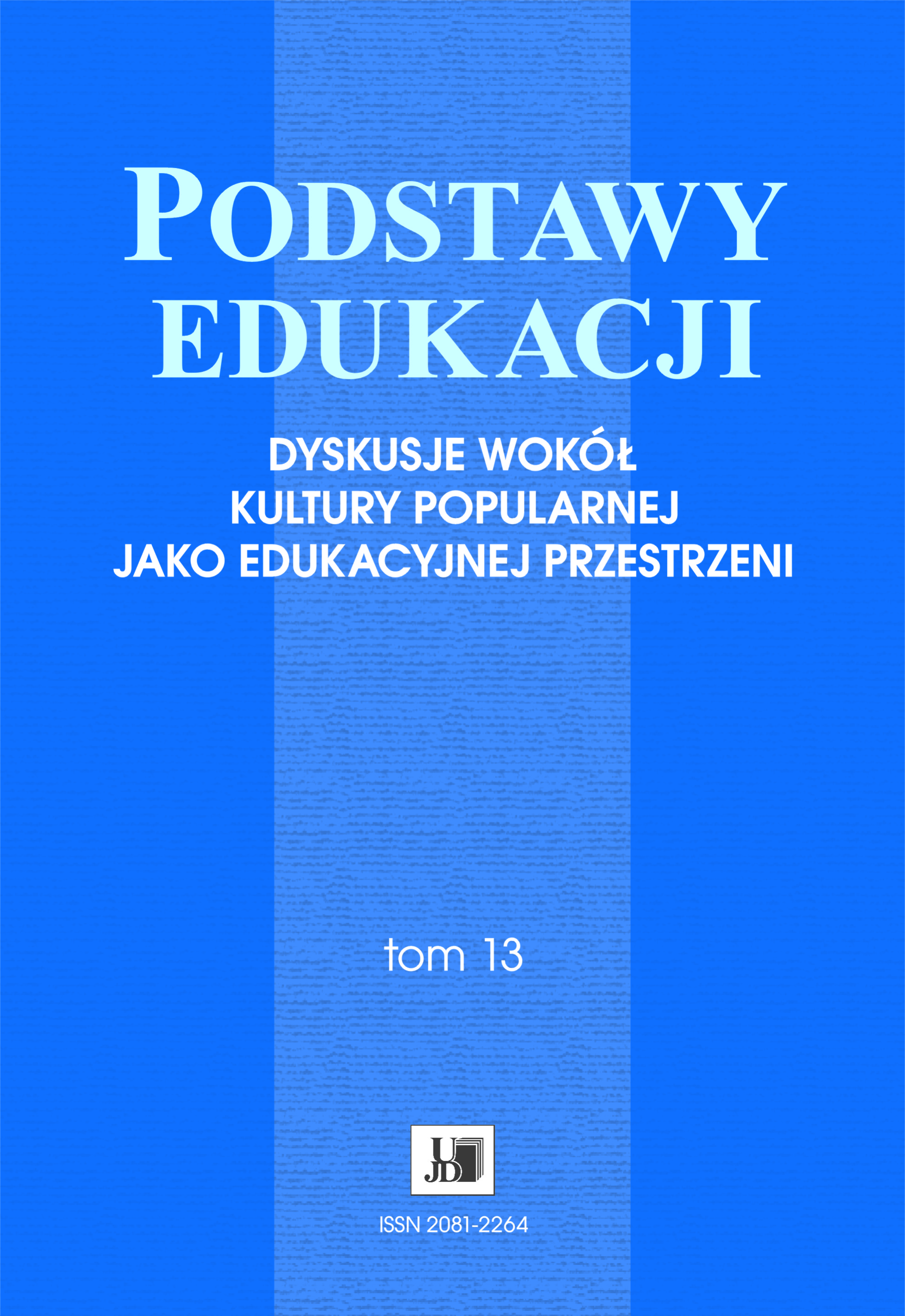Abstrakt
Artykuł ma charakter przeglądowy. Celem niniejszego tekstu jest przegląd koncepcji dotyczą-cych wpływu kultury popularnej na dzieci i młodzież. Duże możliwości kultury popularnej powodują, że wpływ ten nie jest jednoznaczny i przewidywalny. Koncepcje ukazują zatem jedynie pewne tendencje. Dzieci i młodzież z całą pewnością są szczególnymi odbiorcami treści kultury popularnej. Dynamika ich rozwoju ma wpływ na sposób odbierania treści. Z drugiej jednak strony mogą być nie tylko biernymi odbiorcami, ale także odbiorcami aktywnymi, którzy przetwarzając docierające treści, mogą z nich czerpać dodatkowe korzyści. Z tego względu kultura popularna staje się przestrzenią edukacyjną z dużym potencjałem, którym trzeba jednak umiejętnie dysponować, aby osiągnąć zamierzone efekty pracy.
Bibliografia
Bralczyk, J. (2004). Język na sprzedaż. Gdańsk: GWP.
Buelow, S. (2017). Popular Culture and Academic Literacies Situated in a Pedagogical Third Space, Reading Horizons: A Journal of Literacy and Language Arts, 56 (1).
Chan, H. W. (2016). Popular Culture, English Out-of-class Activities, and Learner Autonomy among Highly Proficient Secondary Students in Hong Kong, Universal Journal of Educational Research, 4 (8).
Cramp, A., McDougall, J. (2019). Using Popular Culture to Explore Key Debates, Nowy Jork: Routledge.
Dune, T., Bidewell, J., Firdaus, R., Kirwan, M. (2016). Communication Idol: Using popular culture to catalyse active learning by engaging students in the development of entertaining teaching and learning resources, Journal of University Teaching & Learning Practice, 13 (5).
Furmanek, M. (2006). Edukacja medialna – edukacja dzieci i rodziców. W: S. Juszczyk, I. Polewczyk (red.). Dziecko w świecie informacji i komunikacji. Toruń: Adam Marszałek.
Gil, A. (2009) Wychowanie w kulturze pop – patrząca młodzież w trzech odsłonach. W: M. Kondracka, A. Łysak (red.), Edukacja, wychowanie, poradnictwo w kulturze popularnej. Uniwersytet Wrocławski: Wrocław.
Goban – Klas, T. (2006). Media i komunikowanie masowe. Warszawa: PWN.
Hejwosz, D., Jakubowski, W. (2010). Wstęp. W: J. Drozdowicz, M. Bernasiewicz (red.). Kultura popularna w społeczeństwie współczesnym. Teoria i rzeczywistość. Kraków: Impuls.
Hurlock, E. B. (1985). Rozwój dziecka. Warszawa: PWN.
Jakubowski, W. (2014). Media i kultura popularna jako obszar studiów nad edukacją. Studia Edukacyjne 2014, 30.
Jubas, K., Taber, N., Brown T. (red.) (2015), Popular Culture as Pedagogy, Rotterdam-Boston-Taipei: Springer.
Kossowski, P. (1999). Dziecko i reklama telewizyjna. Warszawa: Żak.
Kozłowska, A. (2006). Odziaływanie mass mediów. Warszawa: Szkoła Główna Handlowa.
Krajewski, M. (2003). Kultury kultury popularnej, Poznań: PWN.
Lievrouw, L. A. (2012). Media alternatywne i zaangażowane społecznie. Warszawa: PWN.
Melosik, Z. (2013). Kultura popularna i tożsamość młodzieży. Kraków: Impuls.
Melosik, Z., Szkudlarek, T. (2009). Kultura, tożsamość i edukacja. Kraków: Impuls.
Ostaszewska, A. (2013). Popkulturowe ramy tożsamości. Media, kultura popularna, Internet jako nowe środowiska kształtowania tożsamości, Warszawa: ORE.
Ritzer, G. (1997), Mcdonaldyzacja społeczeństwa, Warszawa: MUZA SA.
Siemieniecki, B. (2007). Manipulacja informacją w mediach a edukacja. W: B. Siemieniecki (red.). Manipulacja – media – edukacja. Toruń: Adam Marszałek.
Słysz, A. Arcimowicz, B. (2008). Przyjaciele w Internecie. Gdańsk: GWP.
Strinati, D. (1998). Wprowadzenie do kultury popularnej. Poznań: Zysk i S–ka.
Tomaszewska, H. (2012). Młodzież, rówieśnicy i nowe media. Społeczne funkcje technologii komunikacyjnych w życiu nastolatków. Warszawa: Żak.
Trempała, J. (2011). Psychologia rozwoju człowieka. Podręcznik akademicki. Warszawa: PWN.
Zakrzewski, S. P. (2012). Zjawiska patologii społecznej. Przyczyny – przebieg – skutki. Poznań: WNPiD UAM.

Utwór dostępny jest na licencji Creative Commons Uznanie autorstwa 4.0 Międzynarodowe.
Prawa autorskie (c) 2020 Podstawy Edukacji
